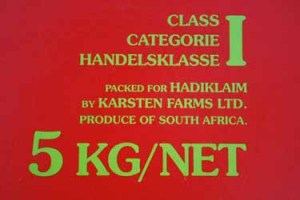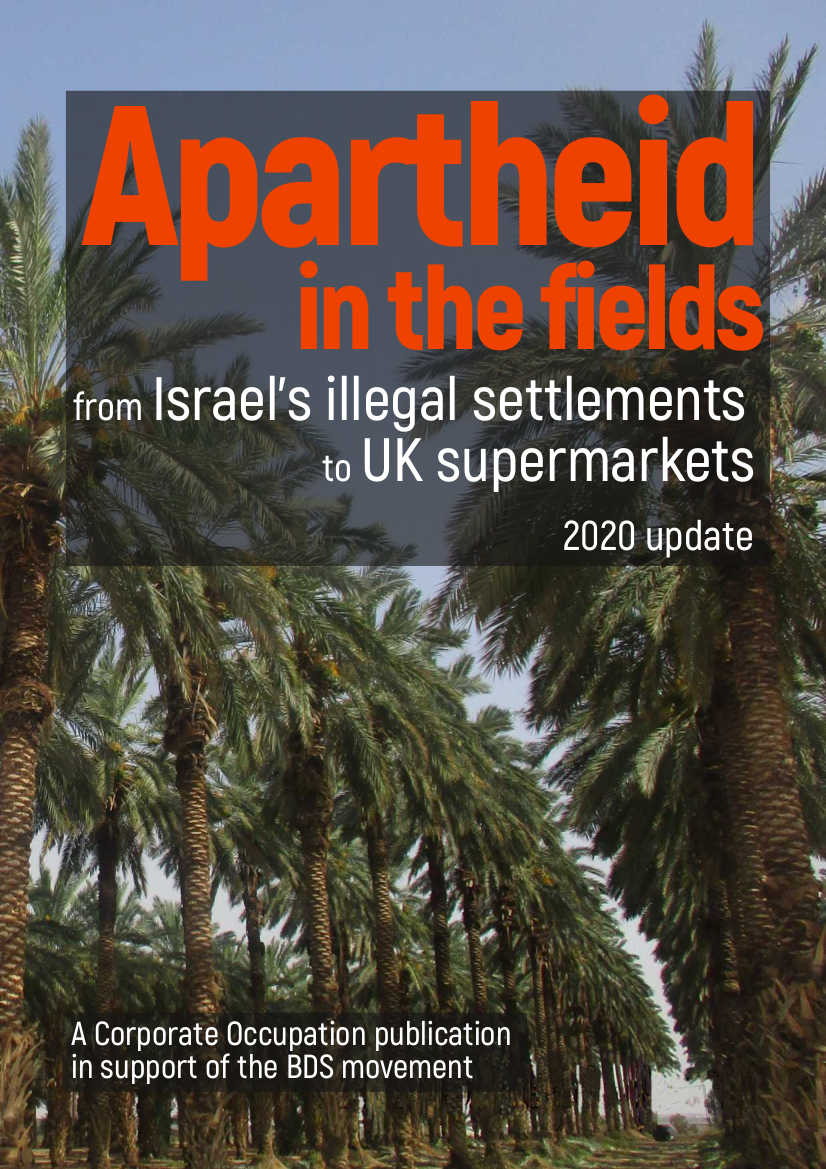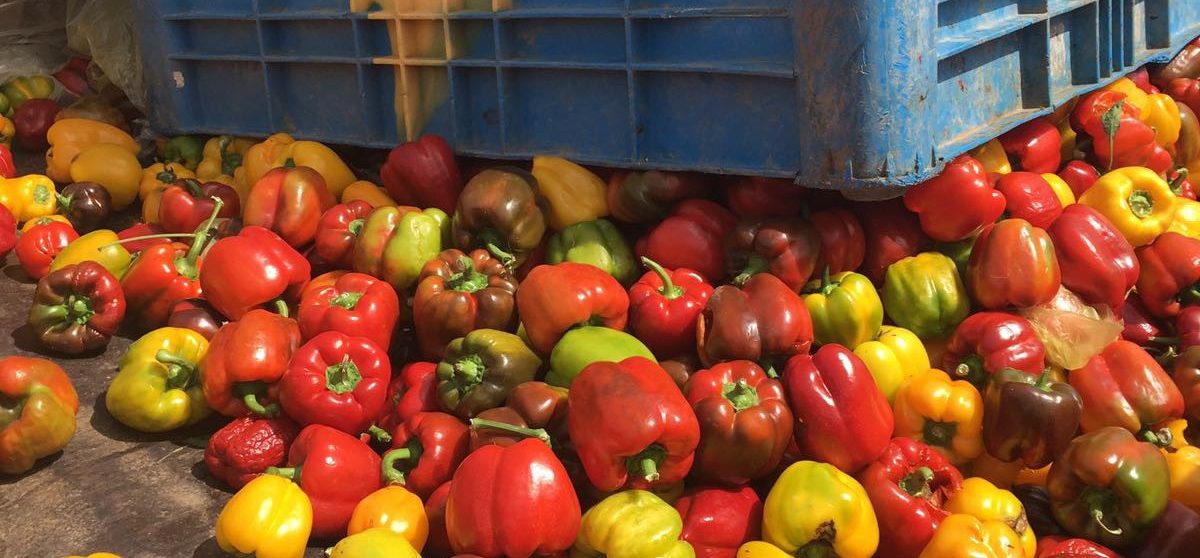By Tom Anderson
A South African fruit grower is selling dates to an Israeli settler company.
Since writing about Hadiklaim’s business in the Jordan Valley, Corporate Watch has been overwhelmed by questions about boxes of Hadiklaim dates labelled ‘Produce of South Africa’. These dates are sold to Hadiklaim by Karsten Farms, a South African fruit growing group, and then packaged under the Jordan River or Kalahari brandnames and exported to Europe.
Karsten (www.karsten.co.za) is a large South African business, employing 5000 people in South Africa, which operates a pack house in Egypt and a distribution and marketing centre in the UK. It is the parent company of the largest grape exporter in South Africa and grows grapes dates, apples, melons and citrus on a total of 1,527 hectares.[2]
They are a supplier of grapes to Tesco and their goods are sold in South Africa in Pick n Pay, Spar and Woolworths. The company is in receipt of a loan from the World Bank and a partner in one of the World Bank’s programmes.[1]
Pieter Karsten, the company MD, told Corporate Watch that Karsten Farms had been working with Hadiklaim for two years and that Hadiklaim were Karsten’s “biggest customer”.
Karsten sell dates, including medjoul dates, to Hadiklaim. The company were cagey about the value of the sales but said it was less than 5% of their annual produce. Karsten claims that all dates sold in South Africa are from local sources.
The appearance of dates labelled Jordan River, claiming to be ‘produce of South Africa’ has caused consumer confusion, and allegations of boycott busting, in Europe.[4] Many campaigners have suspicions that joint ventures like this one are designed to confound the movement for an international boycott.
Karsten Farms have been criticised in South Africa by the Friends of Al Aqsa and others over their dealings with Hadiklaim. Muslim bodies have been in touch with Pieter Karsten over calls to boycott the company.
The Muslim Judicial Council (MJC), a body who oversee whether foodstuffs are Halal and who advocate a boycott of Israeli goods, have publicly announced that Karsten farms should not be boycotted; Nabeweya Malick said that “if the dates South African Muslims are consuming are not from Israeli sources, there are no grounds to call for a boycott. The market is so broad and trade continues every minute with various companies. For us in South Africa the facts are clear that Karsten’s does not sell Israeli dates from their farms. The relationship between Karsten Farms and Hadikliam is a totally different one and we cannot dictate to them who they can or can not trade with.”[5]
The MJC’s statement totally ignores the basis for the international boycott, divestment and sanctions (BDS) campaign against Israel, namely the calls from Palestinian civil society, made after the International Court of Justice’s ruling that Israel’s apartheid wall was illegal in 2005.
The Palestinian BDS call, “inspired by the struggle of South Africans against apartheid and in the spirit of international solidarity” – demands action from all levels of society – asking consumers to pledge not to buy Israeli goods (such as Hadiklaim dates), but crucially calls on companies to refrain from entering into business arrangements with Israeli companies.
Corporate Watch contacted Michael Deas, the European coordinator of the Palestinian BDS Boycott National Committee, a civil society coalition that acts as a reference for the global BDS movement. Deas said “Karsten Farms has an illicit connection with a settlement company. The company should sever this connection immediately and end its active complicity with Israeli Apartheid.”
Hadiklaim buys Karsten’s dates to facilitate an all year-round supply to the export market; South African dates are harvested in March and April[6], six months later than in Israel. Hadiklaim’s business with Karsten Farms helps the settler company to operate as an international exporter. So in selling produce to Hadiklaim, Karsten are supporting Hadiklaim’s dealing with settlement growers, their growers’ use of cut price Palestinian labour and colonised land,[7] and are disregarding the popular call from a broad section of Palestinian civil society – the disposessed people of Palestine living under occupation, apartheid or in diaspora. As such Karsten Farm’s products should be boycotted.
In the past years the international campaign against Israeli dates, particularly during the Ramadan period where Muslims often break their fast with medjoul dates, has been growing exponentially. This year, in the run up to Ramadan, shops in the North of England and Scotland put up posters announcing that they were free of Israeli goods.[8] In South Africa there has been renewed interest in Israeli brandnames on South African date packaging.[9] Karsten Farms have every reason to be concerned as they supply 95% of all dates sold in South Africa and rely on the country’s Muslim community as a consumer base.
In 2009 Pieter Karsten told South African Muslims that he was concerned with ‘the plight of the Palestinians’ and that he would reconsider his relationship with Hadiklaim.[10] However, when Corporate Watch spoke to him in 2010 the company was still selling dates to Hadiklaim and, although Pieter Karsten reiterated that he would consider “revising the relationship” there was no sign of any movement.
In a conversation with Corporate Watch Pieter Karsten maintained that a boycott of his company would be unfair as others were engaged in similar practices. Similarly, the MJC argued that business relationships exist between hundreds of South African companies and Israeli companies and it would be impossible to be ‘consistent’. These arguments are a recipe for inertia and inaction, the same inaction that has allowed Israel to colonise Palestinian land and commit war crimes against Palestinians since 1948. The business relationships that the MJC refer to should not exist and the fact that other companies do business with Israel does not excuse Karsten Farm’s actions.
Karsten farms have an office in the UK: Bowmans Chilled Stores, Camelgate, Spalding, Lincolnshire, PE12 6ES, 01775 768547, www.karstenuk.co.uk
[1] International Finance Corporation, South Africa and Egypt: Karsten Farms Illustrates South-South Cooperation, December 2007 – http://www.ifc.org/ifcext/africa.nsf/Content/840BE4EB19222A05422573D300444EFC?OpenDocument
[2] International Finance Corporation – http://www.ifc.org/ifcext/spiwebsite1.nsf/1ca07340e47a35cd85256efb00700cee/B27D240C2E42FDAC852576BA000E27B2
[3] Fruitnet.com, Fred Meintjes, Karsten Farms Handed Tesco Award – http://www.fruitnet.com/content.aspx?cid=2102&ttid=6&sid=355
[4] See, for example, AT5 Bovenop Amsterdam, Supermarkt Sjoemelt met Israëlische Dadels, Aug 2010, http://www.at5.nl/artikelen/47034/dadels
[5] Halaal Talk, Karsten Farms Cleared in Date Saga, September 2009 – http://halaaltalk.wordpress.com/2009/09/01/karsten-farms-cleared-in-date-saga/
[6] Karsten Farms – http://www.karsten.co.za/framework/product_listing.php?catid=38
[7] See Corporate Watch, 2010 – http://corporateoccupation.wordpress.com/2010/08/12/hadiklaim-in-the-jordan-valley/
[8]Jasper Hamill, Sunday Herald, Small Shops Israel Boycott goes Nationwide in Scotland, September 2010 – http://www.scottishpsc.org.uk/index.php?option=com_content&view=article&id=3517:small-shops-israel-boycott-goes-nation-wide-in-scotland&catid=418:news&Itemid=200298
[9] Faatimah Hendricks, Voice of the Cape, Dates Sold Locally: Grown in SA, August 2010 – http://www.vocfm.co.za/index.php?section=news&category=vocnews&article=54457
[10]Halaal Talk, Karsten Farms Cleared in Date Saga, September 2009 – http://halaaltalk.wordpress.com/2009/09/01/karsten-farms-cleared-in-date-saga/





0 Comments